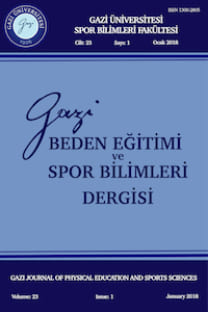FUTBOL ANTRENÖRLERİNİN MAÇ DENEYİM SAYILARINA GÖRE LİDERLİK GÜCÜ ALGILARI
Bu araştırmanın amacı,
futbol antrenörlerinin maç deneyim sayılarına göre (2-35, 36-99, 100-299,
300-1100) liderlik gücü algılarını araştırmaktır. Bu araştırmada, Futbolda
Liderlik Gücü Ölçeği-Kendi (FLGÖ-K: Antrenör Formu) ve antrenörlerin maç
deneyim sayılarıyla ilgili soruları da içeren bir anket formundan yararlanılmıştır.
FLGÖ-K ile erkek futbol antrenörlerinden (n=165) toplanan verilerin Tek Yönlü
ANOVA analizleri; antrenörlerin maç deneyim sayılarına göre Zorlayıcılık Gücü
(ZG), Özdeşleşim Gücü (ÖZG), Yasal Güç (YG) ve Uzmanlık Gücü (UG) algılarının
hiçbirinde anlamlı bir farklılık olmadığını göstermektedir (p>.05). Bu
bulgular, antrenörlerin maç deneyim sayıları attıkça liderlik gücü algılarının
artmadığını ortaya koymaktadır. Antrenörlerin liderlik gücünde artma veya
azalma, antrenörlerin maç deneyim sayılarından daha başka değişkenlerle ilişkili
olabilir. Antrenörlerin maç deneyim sayıları ve liderlik gücü algılarıyla
ilgili daha kesin sonuçlar çıkarabilmek için, daha ayrıntılı analizlere
gereksinim vardır. Örneğin; antrenörlerin profesyonellik ve amatörlük
deneyimleri, yaş, cinsiyet, eğitim seviyesi ve elde ettikleri başarılar gibi.
Anahtar Kelimeler:
Liderlik Gücü Algısı, Futbol, Futbol Antrenörü, Maç Deneyim Sayısı
LEADERSHIP POWER PERCEPTION OF SOCCER COACHES ACCORDING TO THEIR NUMBER OF GAME EXPERIENCE
The purpose of this study
was to analyze the leadership power perception of soccer coaches according to
their number of game experience. Adapted Turkish version of Power in Soccer
Questionnaire-Self (PSQ-S for soccer coaches) and a questionnaire related to
number of game experience for soccer coaches were used in this study. Data were
collected by PSQ-S from male soccer coaches (n=165). One-Way ANOVA revealed no
significant differences between any measured leadership power perception of
soccer coaches (coercive, referent, legitimate and expert powers) and their
number of game experience (p>.05). More research is needed including the
other variable of soccer coaches. For example; leadership styles, personality
traits, amateur and professional experience, age and gender, number of home and
away games, major coaching successes and coaching support staff and so on.
___
- 1. Chelladurai, P. (1990). Leadership in Sports: A Review. International Journal of Sport Psychology, 21, 328-354.
- 2. Chelladurai, P. Haggerty, T. R. Baxter, P. R. (1989). Decision Style-choices of University Basketball Coaches and Players. Journal of Sport and Exercise Psychology, 11, 201-215.
- 3. Chelladurai, P. (1984). Discrepancy Between Preference and Perception of Leadership Behavior and Satisfaction of Athletes in Varying Sports. Journal of Sport Psychology, 6, 27-41.
- 4. Cote, J.Salmela, J. H. Russell, S. J. (1995). The Knowledge of High Performance Gymnastics Coaches: Competition and Training Considerations. The Sport Psychologist, 6, 76-95.
- 5. Cote, J. Salmela, H. J. Trudel, P. Baria, A. Russell, J.S. (1995). The Coaching Model: A Grounded Assessment of Expert Gymnastics Coaches’ Knowledge. Journal of Sport and Exercise Psychology, 17, 1-17.
- ISSN: 1300-2805
- Yayın Aralığı: Yılda 4 Sayı
- Başlangıç: 1996
- Yayıncı: Gazi Üniversitesi
Sayıdaki Diğer Makaleler
FUTBOL ANTRENÖRLERİNİN MAÇ DENEYİM SAYILARINA GÖRE LİDERLİK GÜCÜ ALGILARI
DANSTAKİ ETİK DEĞERLER ÖLÇEĞİ: ÖLÇEK GELİŞTİRME ÇALIŞMASI
Emel TAŞKIRAN, Fatih YENEL, Bülent GÜRBÜZ
Erkan Faruk ŞİRİN, Hakan Salim ÇAĞLAYAN, Alparslan İNCE
YARIŞMA BENLİK SUNUMU ENVANTERİ TÜRKÇE VERSİYONU’NUN GEÇERLİK VE GÜVENİRLİK ÇALIŞMASI
